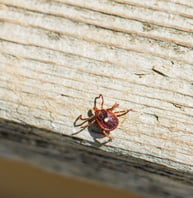
As New Englanders, we’re used to the yearly warnings about tick season; it almost seems like every year is the “worst one yet” when it comes to tick activity. For the most part, we all know the basics about protecting ourselves from tick bites, how to remove a tick, and what to watch for if we’re bitten – But in recent years, a new threat has moved into Massachusetts: the lone star tick. These ticks are reported to be especially aggressive this time of year, and their bite can cause a relatively new condition known as Alpha-Gal Syndrome. Here’s what you should know.
The lone star tick is the primary source of the alpha galactose molecule that causes Alpha-Gal Syndrome (AGL). According to the Mayo Clinic, AGL is an allergy to meat products such as beef, pork, lamb, venison, rabbit, and other animal products that come from mammals. Symptoms vary on a case-to-case basis, but can include rash, hives, extreme itchiness, swelling, nausea and vomiting, stomach pain, dizziness, low blood pressure, or trouble breathing.
The best way to avoid AGL is to steer clear of areas where ticks live, or be sure to practice effective tick bite prevention. Here are some tips:
- Wear long sleeves, pants, and tall socks
- Wear light-colored clothing to make ticks easier to spot
- Avoid brush, tall grass, and leaf litter
- Frequent body checks for people and pets
- Shower and change clothes after spending time outdoors
- Use an EPA-approved repellent
- Know how to safely remove a tick if you are bitten
- Know the symptoms of tick-borne diseases
Reduce your risk and take back your yard with professional tick control from Burgess Pest – select a standalone program or enroll in our most popular plan, the P10+MT, for protection from ticks and mosquitoes plus 10 common household pests. Already signed up for a Pad Protection Plan? Adding tick and mosquito control is as easy as giving us a call! Click the button below to request a free estimate.
For even more “tick talk”, download our free Tick & Mosquito Season Survival Guide here.


